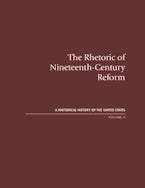The years between 1870 and 1910 were filled with dramatic social, political and economic changes in the United States. In response, public discourse of the "Gilded Age" often drew on the tenets of Social Darwinism.
The application of oversimplified Darwinian principles to social issues exerted a powerful influence on the discourse of the era. While the principles were used to support arguments for social changes that envisioned a gradual evolution of a species toward greater perfection, such as women's suffrage, they were also used to oppress African Americans, who were not, it was thought by many in powerful positions, as highly "evolved" as white Americans.
The ideas of social Darwinism accorded well with American beliefs that were derived from Puritanism, especially the idea that anyone could enjoy economic success if only she or he worked hard enough. This volume explores how that theme permeated public advocacy during the Gilded Age.

